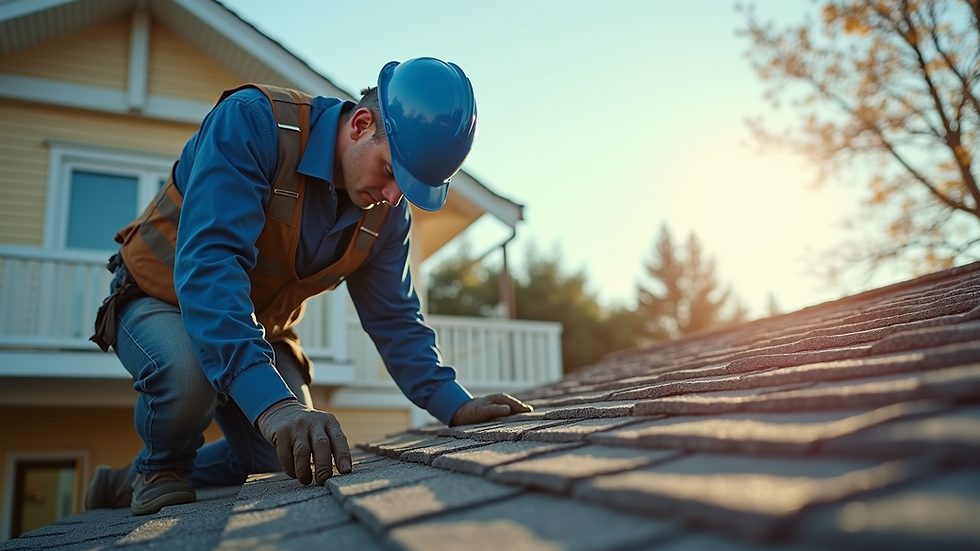Comprehensive Guide to Home Inspection Services
- Mark Rogers
- Nov 1
- 4 min read
When buying or selling a property, understanding the condition of the home is crucial. Comprehensive home inspections provide a detailed evaluation of a property's structure and systems. This guide will walk you through everything you need to know about these inspections, helping you make informed decisions and avoid costly surprises.
Understanding Comprehensive Home Inspections
A comprehensive home inspection is a thorough examination of a property's physical structure and systems. It covers everything from the roof to the foundation, including electrical, plumbing, heating, and cooling systems. The goal is to identify any existing or potential issues that could affect the safety, functionality, or value of the home.
During the inspection, a certified inspector will assess:
Structural integrity (walls, roof, foundation)
Electrical wiring and outlets
Plumbing systems and fixtures
Heating, ventilation, and air conditioning (HVAC)
Insulation and ventilation
Windows and doors
Appliances and safety features
The inspector will then provide a detailed report outlining their findings, often with photos and recommendations for repairs or further evaluation by specialists.

This report is invaluable for buyers, sellers, and real estate agents. Buyers can negotiate repairs or price adjustments, sellers can address issues before listing, and agents can better advise their clients.
Why Choose Comprehensive Home Inspections?
Choosing a comprehensive inspection over a basic one ensures no critical detail is overlooked. Basic inspections might only cover major systems superficially, while comprehensive inspections dig deeper into the property's condition.
Here are some benefits of comprehensive home inspections:
Peace of Mind: Knowing the exact condition of the home reduces stress and uncertainty.
Cost Savings: Identifying problems early can prevent expensive repairs later.
Negotiation Power: Detailed reports provide leverage during price negotiations.
Safety Assurance: Detecting hazards like faulty wiring or structural damage protects occupants.
Maintenance Planning: Helps homeowners plan for future upkeep and improvements.
For example, a comprehensive inspection might reveal hidden water damage behind walls or outdated electrical panels that a basic inspection could miss. This level of detail is essential for older homes or properties with complex systems.

If you want to learn more about reliable home inspection services, visiting a trusted provider’s website can offer additional insights and booking options.
What are the 4 Types of Inspection?
Understanding the different types of inspections can help you choose the right one for your needs. The four main types are:
General Home Inspection: A broad evaluation of the home’s major systems and components. It covers structural elements, roofing, plumbing, electrical, and HVAC but may not include specialized areas.
Pest Inspection: Focuses on identifying signs of pest infestations such as termites, rodents, or wood-boring insects. This is crucial in areas prone to such problems.
Radon Inspection: Tests for radon gas, a radioactive gas that can accumulate indoors and pose health risks. This inspection is often recommended in regions with high radon levels.
Specialized Inspections: These include inspections for mold, asbestos, sewer lines, or specific systems like pools or septic tanks. They are usually conducted when a general inspection raises concerns or when the property has unique features.
Choosing the right type depends on the property’s age, location, and your concerns. Sometimes, multiple inspections are necessary to get a full picture.

How to Prepare for a Home Inspection
Preparation can make the inspection process smoother and more effective. Here are some practical tips:
Clean and Declutter: Ensure easy access to areas like the attic, basement, and utility rooms.
Provide Documentation: Gather any maintenance records, warranties, or previous inspection reports.
List Questions: Prepare a list of concerns or questions to discuss with the inspector.
Be Present: Attend the inspection if possible to observe and ask questions in real time.
Check Utilities: Make sure water, electricity, and gas are turned on for testing.
By preparing well, you help the inspector perform a thorough job and gain a better understanding of the home’s condition.
What to Expect After the Inspection
After the inspection, you will receive a detailed report. This document typically includes:
Summary of findings
Photographs of issues
Recommendations for repairs or further evaluation
Estimated costs for major repairs (sometimes)
Review the report carefully and discuss any concerns with your real estate agent or the inspector. Use the information to:
Negotiate repairs or price adjustments with the seller
Plan your budget for immediate and future repairs
Decide whether to proceed with the purchase or sale
Remember, no home is perfect. The goal is to understand the condition and make informed decisions.
Making the Most of Your Inspection
To get the best value from your comprehensive home inspection:
Choose a certified and experienced inspector.
Attend the inspection to learn firsthand about the property.
Use the report as a tool for negotiation and planning.
Don’t ignore minor issues; they can become major problems over time.
Consider follow-up inspections if recommended.
A thorough inspection is an investment that can save you money and stress in the long run.
Comprehensive home inspections are a vital step in the property buying or selling process. They provide clarity, confidence, and control over one of the most significant investments you will make. By understanding what to expect and how to prepare, you can ensure the inspection delivers maximum benefit and helps you make the best decisions for your future home.








Comments